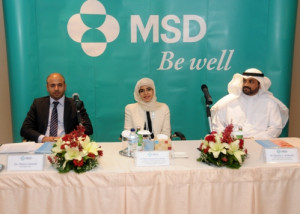Respiratory disease and hospitalization has increased by up to 25% due to sandstorms
Kuwait City, Kuwait — April 22nd, 2013–Today, as part of their ongoing commitment to raising awareness of key health problems that affect the local communities in which they work, MSD launched an awareness campaign to educate Kuwaiti citizens on the serious dangers sandstorms pose and provide information on the best ways to manage respiratory problems resulting from these storms. Hosted at the Marina hotel in Kuwait, the event brought together medical and environmental experts who discussed the causes and dangers of sandstorms, as well as the best way for Kuwaiti citizens to protect themselves during sandstorms.
Talking about their decision to launch the campaign, Mr. Mazen Altaruti, Managing Director of MSD Gulf said “On average, Kuwait faces up to 26 severe sandstorms each year.[1] In many cases these sandstorms can last for several hours or sometimes even the whole day, bring traffic to a standstill, forcing places of work and school to close and significantly increasing the number of hospitalizations. Officials have suggested that hospital admissions due to respiratory diseases such as asthma have increased by more than 25% over the last few years, as a result of severe weather; particularly sandstorms.[2] At MSD we are committed to addressing the issues and health problems that affect the local community most, and in Kuwait sandstorms are a serious and growing problem.”
In addition to being a major safety issue, with increased car accidents as sandstorms can reduce visibility to almost zero, these storms are a major cause of allergic rhinitis. Sandstorms carry large amounts of allergens including bacteria, fungi, viruses and pollens and because sandstorms have the ability to carry these allergens over large distances, the risk of bacterial and viral infections greatly increases during the sandstorm season.[3]
Elaborating on why sandstorms occur, Dr. Hassan A. Al – Dashti, Climatology Superintendent/ Meteorology Department-State of Kuwait, said “Sand or dust storms are a weather phenomenon that is represented by a confluence of dust particles carried by turbulent and strong wind to higher altitude; which severely deteriorates the horizontal visibility in terms of meteorology. There are a number of different causes that play a role in dust eruption, dust transportation and dusts rising locally; most of these causes are directly related to the effecting pressure systems, weather fronts and cumulus clouds. There are different sources of dust and aerosols; however, the most dominant source is dust traveling from neighboring region of Iraq, Syria and eastern territories of Jordan. The wind moves the dust south towards the UAE causing sandstorms. Mr. Farah went on to add “It is difficult to control sand or dust storms, due to the spread of deserts and sand dunes in the country and the surrounding regions; in fact this is one of the major reasons for the increase in sandstorms over the last few years.”
Talking about the health risk of sandstorms, Dr. Mona Sulaiman Al-Ahmad, a Consultant Internist, Allergist and Clinical Immunologist for the department of allergy, at the Kuwait Ministry of Health “Sandstorms are a major cause of bacterial and viral infection particular amongst those with weaker immune systems such as the elderly and pediatrics, in addition to those with compromised immune systems. Additionally, because of the large load of pollen s that these storms carry, allergies commonly known as allergic rhinitis, and allergic asthma, are also a big emerging problem. In severe cases and when left untreated, allergic rhinitis can lead to asthma, even in patients with no previous history of this illness. The awareness campaign which is supposed to run over the next few months, in-line with Kuwait’s sandstorm season; will focus on providing patients and medical professionals with important information on how to manage allergies and respiratory problems during these sandy months. Globally it is estimated that over 400 million people suffer from allergies, and over 22% of Kuwaiti school children suffer from allergic rhinitis.[4] Research has shown that by simply raising awareness of key disease areas the health and well being of citizens is significantly improved.
–End–
About MSD Gulf
MSD, also known as Merck in North America, is the second-largest healthcare company in the world and a global leader in consumer products and animal care. For more than 35 years, MSD Gulf has been preserving and improving human life by promoting access to medicines and vaccines and making these products available to all who need them. MSD Gulf operates in the UAE, Kuwait, Bahrain, Qatar and Oman, employing over 50 healthcare professionals, and ranks among the leading pharmaceutical companies in the region. Through its local distributors, MSD Gulf provides innovative products based on the highest level of scientific excellence including products for cardiovascular issues, asthma, pain and inflammation, osteoporosis, neurological issues, and ophthalmic pathological disorders, in addition to several specialized hospital products and vaccines.
For more information, visit www.merck.com or connect with us on Twitter, Facebook and YouTube.
About MSD
Today’s MSD is a global healthcare leader working to help the world be well. MSD is a trade name of Merck & Co., Inc., with headquarters in Whitehouse Station, N.J., U.S.A. Through our prescription medicines, vaccines, biologic therapies, and consumer care and animal health products, we work with customers and operate in more than 140 countries to deliver innovative health solutions. We also demonstrate our commitment to increasing access to healthcare through far-reaching policies, programs and partnerships. For more information, visit www.merck.com and connect with us on Twitter, Facebook and YouTube.
[1] Al-Duweizri A. Kuwait bears most number of sandstorms in the area. Arabtimes. 9 Jun. 2013.
[2] Rai B. S. Cases of Respiratory Problems up in UAE as Sandstorms Rage on. Emirates 24/7. 2012.
[3] Yamada P. Hatta T. et al. Inflammatory and Degranulation Effect of Yellow Sand on RBL-2H3 Cells in Relation to Chemical and Biological Constituents. Ecotoxicology and Environmental Safety. 84 (2012) 9 -17
[4] Al Ahmed M. Asthma and allergic rhinitis in the gulf and near east. Al-Rasheed Allergy Centre. 10 Dec. 2010.

